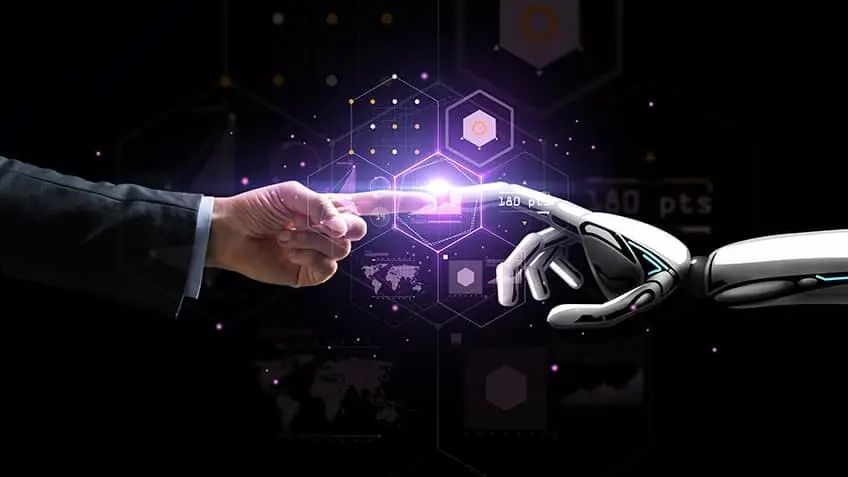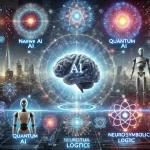
Who Can Benefit from Learning AI?
December 5, 2024What is AI?
Artificial Intelligence (AI) refers to the simulation of human intelligence processes by machines, particularly computer systems. These processes include learning (acquiring information and rules for using it), reasoning (using rules to reach approximate or definite conclusions), and self-correction. AI encompasses various subfields like machine learning, natural language processing, computer vision, and robotics, aiming to create systems that can perform tasks typically requiring human intelligence.
Importance of Learning AI
AI has become a cornerstone of modern technology, influencing nearly every industry. Learning AI equips individuals with the skills to navigate and thrive in a world increasingly driven by intelligent systems. For students and professionals, understanding AI opens up opportunities for innovation, problem-solving, and career advancement. AI knowledge also fosters critical thinking about its ethical, societal, and economic implications, ensuring responsible use and development.
AI’s Impact
AI has transformative potential across numerous sectors:
- Healthcare: AI-powered diagnostics, personalized treatment plans, and drug discovery.
- Education: Adaptive learning platforms and intelligent tutoring systems.
- Business: Automation of routine tasks, predictive analytics, and customer service improvements.
- Agriculture: Precision farming, pest detection, and yield optimization.
- Transportation: Autonomous vehicles and intelligent traffic management.
- Environment: Climate modeling and wildlife conservation.
AI continues to revolutionize how we live, work, and interact, making it essential to understand and harness its potential responsibly.
II. Beneficiaries of AI Knowledge
1. Students and Learners
AI knowledge benefits a diverse range of learners, regardless of their academic or professional background:
STEM Students
For students in science, technology, engineering, and mathematics (STEM), AI is a critical skill that enhances expertise in fields like:
- Engineering: AI-driven automation, smart systems, and control mechanisms.
- Computer Science: Core AI technologies like machine learning, neural networks, and algorithm design.
- Robotics: Designing intelligent robots capable of perception, decision-making, and self-learning.
Acquiring AI knowledge prepares STEM students for cutting-edge innovations and research in their fields.
Non-STEM Students
AI is equally impactful in arts, humanities, and social sciences:
- Arts: Generative AI tools for creating music, visual art, and design.
- Humanities: AI-powered text analysis for studying history, literature, and linguistics.
- Social Sciences: Using AI to analyze behavioral patterns, survey data, and societal trends.
Non-STEM students gain new perspectives and tools for creativity, analysis, and problem-solving by integrating AI into their disciplines.
Lifelong Learners
For individuals committed to continuous education, AI knowledge helps in:
- Personal Growth: Exploring AI-driven applications for hobbies, creative endeavors, or understanding technology.
- Professional Development: Staying relevant in a rapidly evolving job market by acquiring AI skills applicable to various industries.
- Entrepreneurship: Leveraging AI to create innovative business models, optimize operations, or develop new products and services.
AI literacy empowers learners from all walks of life to embrace opportunities and address challenges in a technology-driven world.
2. Industry Professionals
AI knowledge significantly benefits professionals across various industries by enhancing their capabilities and improving efficiency:
IT and Software Developers
For IT professionals and software developers, AI opens avenues for advanced skill development in:
- AI Programming: Writing algorithms for machine learning and deep learning models.
- Automation: Developing systems to streamline processes and reduce repetitive tasks.
- Innovation: Building intelligent applications, such as chatbots, recommendation systems, and computer vision tools.
Mastering AI technologies ensures that IT professionals stay competitive in a rapidly evolving tech landscape.
Healthcare Workers
AI has become indispensable in modern healthcare, allowing professionals to:
- Enhance Diagnostics: Using AI-powered imaging and pattern recognition for accurate disease detection.
- Optimize Treatment Planning: Personalizing care based on patient data and predictive modeling.
- Improve Access: Supporting telemedicine platforms for remote consultations and monitoring.
By integrating AI into their practice, healthcare workers can provide faster, more accurate, and patient-centered care.
Finance Experts
AI equips finance professionals with tools to analyze data, manage risks, and optimize investments:
- Predictive Analytics: Forecasting market trends to make informed decisions.
- Fraud Detection: Identifying suspicious activities using AI-driven anomaly detection.
- Portfolio Management: Automating asset allocation and performance tracking for better client outcomes.
AI enhances the ability to manage complex financial ecosystems with precision and efficiency.
Marketing and Sales Teams
AI transforms the way businesses connect with customers, enabling:
- Customer Insights: Using AI to analyze buying behaviors and preferences.
- Targeting: Personalizing advertisements and recommendations for better engagement.
- Campaign Optimization: Leveraging predictive analytics to improve ROI and track campaign performance.
With AI, marketing and sales teams can craft data-driven strategies that resonate with their audience.
AI knowledge empowers industry professionals to innovate, adapt, and lead in their respective fields.
3. Entrepreneurs and Innovators
AI knowledge serves as a powerful enabler for entrepreneurs and innovators, helping them transform ideas into impactful solutions:
Startup Founders
AI offers startup founders the tools to:
- Innovate Solutions: Create AI-driven products and services tailored to address unmet market needs, such as predictive health apps, smart devices, or automation tools.
- Scale Efficiently: Use AI to streamline operations, optimize resources, and reduce costs, enabling rapid scalability.
- Gain Competitive Edge: Leverage AI insights to identify trends, refine business models, and outperform competitors.
Startups adopting AI can revolutionize industries and establish themselves as leaders in their niches.
Small Business Owners
AI empowers small business owners by enabling them to:
- Automate Processes: Use AI tools for inventory management, customer support (chatbots), and marketing automation.
- Improve Decision-Making: Analyze customer behavior, sales trends, and market data to make informed business decisions.
- Enhance Customer Experience: Provide personalized services and recommendations, improving customer satisfaction and loyalty.
AI democratizes innovation, allowing small businesses to compete effectively with larger enterprises.
By harnessing the potential of AI, entrepreneurs and innovators can drive growth, efficiency, and success in their ventures.
4. Government Officials and Policymakers
AI knowledge is increasingly vital for government officials and policymakers to effectively address societal challenges and ensure responsible technology deployment:
Public Services Improvement
AI empowers governments to enhance public services by:
- Streamlining Operations:
- Urban Planning: Using AI to optimize traffic management, reduce congestion, and improve public transportation.
- Healthcare: Implementing AI systems for early disease detection, resource allocation, and telemedicine in underserved areas.
- Resource Management: Analyzing data to allocate funds and resources more efficiently across education, infrastructure, and public safety.
- Disaster Response: Employing AI to predict natural disasters, monitor recovery efforts, and enhance preparedness.
By integrating AI, governments can make services more efficient, accessible, and citizen-focused.
AI Governance
Policymakers play a critical role in shaping the ethical use of AI:
- Regulation: Crafting frameworks to ensure transparency, accountability, and fairness in AI systems.
- Privacy Protection: Establishing guidelines to safeguard citizens’ data and prevent misuse.
- Bias Mitigation: Addressing algorithmic biases to promote equitable outcomes for all societal groups.
- Global Collaboration: Participating in international efforts to standardize AI ethics, interoperability, and risk management.
Strong governance ensures that AI benefits society while minimizing risks and inequalities.
With AI knowledge, government officials and policymakers can lead responsibly in leveraging AI for the public good.
5. Educators and Trainers
AI knowledge empowers educators and trainers to revolutionize teaching methods and curriculum design, ensuring learners are prepared for an AI-driven future:
Curriculum Designers
Educators designing curricula can:
- Introduce AI Concepts Early: Develop age-appropriate lessons that teach students foundational AI concepts, such as machine learning, ethics in AI, and its real-world applications.
- Integrate AI Across Disciplines: Highlight how AI intersects with various subjects, from math and science to arts and humanities.
- Promote Future-Ready Skills: Equip students with problem-solving, critical thinking, and coding skills to navigate AI-driven careers.
By incorporating AI into education, curriculum designers prepare younger generations to thrive in a tech-centric world.
Learning Innovators
AI enables educators to:
- Personalize Education: Use AI-driven platforms to tailor content to individual students’ needs, abilities, and learning styles, ensuring better engagement and outcomes.
- Automate Administrative Tasks: Leverage AI for grading, attendance tracking, and resource management, allowing educators to focus on teaching.
- Enhance Engagement: Integrate interactive AI tools like chatbots, virtual assistants, and gamified learning platforms to make lessons dynamic and fun.
- Analyze Educational Outcomes: Use AI analytics to identify trends in student performance and adapt teaching strategies for improved learning.
AI empowers educators and trainers to innovate, inspire, and create impactful learning environments for all learners.
6. Job Seekers and Career Changers
AI knowledge is a game-changer for individuals looking to enhance their employability or transition into new career paths in today’s technology-driven job market:
Upskilling for AI Roles
AI creates opportunities for individuals to prepare for roles in high-demand fields by:
- Building Expertise: Learning AI programming, machine learning, and data analysis to qualify for roles such as AI developers, data scientists, and automation engineers.
- Developing Soft Skills: Understanding ethical implications, critical thinking, and problem-solving in AI applications to stand out in AI-related positions.
- Certifications and Training: Completing certifications in AI, data science, or machine learning through online courses, bootcamps, and workshops.
Upskilling in AI provides job seekers with a competitive edge in industries where AI expertise is essential.
Transition Opportunities
For those looking to pivot careers, AI offers a pathway to:
- Enter AI-Centric Industries: Transition into growing sectors like healthcare tech, autonomous systems, and fintech, where AI skills are in high demand.
- Leverage Transferable Skills: Apply domain expertise (e.g., healthcare, finance, marketing) alongside AI knowledge to create innovative solutions.
- Freelance and Entrepreneurial Ventures: Use AI tools to start a business or offer specialized services such as data analytics, AI consulting, or content creation.
With AI knowledge, job seekers and career changers can adapt to evolving market trends and secure opportunities in the future workforce.
7. Hobbyists and Creative Minds
AI is an exciting and transformative tool for hobbyists and creatives, offering new ways to explore, experiment, and innovate across various domains:
AI Enthusiasts
For AI enthusiasts, learning and experimenting with AI can be a fulfilling way to:
- Explore AI Technologies: Dive into machine learning, neural networks, and natural language processing to build projects or simply satisfy curiosity.
- Develop Personal Projects: Create AI applications like chatbots, recommendation systems, or even AI-powered apps to solve personal challenges or create innovative solutions.
- Engage with AI Communities: Join forums, attend workshops, or participate in AI competitions to share knowledge and collaborate with like-minded individuals.
AI empowers hobbyists to create and explore in ways that were previously unimaginable, providing endless possibilities for personal growth and innovation.
Creative Applications
AI opens up new creative possibilities for artists, musicians, and multimedia creators:
- Art: Use AI to generate digital artwork, explore new styles, or even collaborate with AI in creating unique pieces that blend human creativity with machine-generated concepts.
- Music: Experiment with AI-powered tools to compose, remix, or generate music based on specific styles or moods. Artists can also use AI for sound design and mastering tracks.
- Multimedia Projects: Leverage AI for video editing, animation, or enhancing storytelling with automated visual effects, voice synthesis, and interactive experiences.
- Design and Fashion: AI can assist in generating new designs, optimizing fashion patterns, or predicting upcoming trends based on data analytics.
AI offers creative minds the opportunity to push boundaries, think outside the box, and enhance artistic expression in a rapidly evolving digital landscape.
8. Society at Large
AI’s influence extends far beyond professionals and industries, touching the lives of the general public. Understanding AI’s broader impact and ethical implications is crucial for responsible engagement with this transformative technology:
General Public
For the general public, gaining a basic understanding of AI is essential to:
- Recognize AI’s Impact: Acknowledge how AI is embedded in daily life, from recommendation algorithms on streaming services to virtual assistants like Siri and Alexa, and even autonomous vehicles.
- Adapt to Changing Technologies: As AI shapes industries and consumer experiences, people must be prepared to adapt to changes in work, shopping, communication, and entertainment.
- Improve Digital Literacy: A basic understanding of AI helps individuals navigate the technology and make informed decisions about privacy, security, and data usage in their personal lives.
Understanding AI empowers the general public to engage with and make conscious choices about the technology shaping their world.
Ethical Awareness
As AI continues to evolve, it’s crucial for society to recognize and address its ethical implications:
- Bias and Fairness: AI systems can reflect and perpetuate biases, so it’s important for society to advocate for fairness, transparency, and inclusivity in AI decision-making.
- Privacy Concerns: With AI’s ability to process vast amounts of personal data, ethical considerations around data privacy, consent, and security are essential to protect individuals’ rights.
- Job Displacement and Economic Impacts: AI may disrupt certain job markets, so society must address potential job displacement and ensure that AI-driven automation benefits everyone, including through retraining programs.
- AI Accountability: Ensuring that AI systems are used responsibly and that there are frameworks for holding developers and companies accountable for unintended consequences or harms caused by AI.
Raising ethical awareness ensures that AI is developed and deployed in ways that promote social good, fairness, and respect for individual rights.
III. Conclusion
Encouraging Exploration
AI is no longer a niche domain—it is a versatile tool that caters to everyone:
- For Professionals: AI offers transformative solutions across industries, driving innovation, efficiency, and growth.
- For Students: It serves as a gateway to future-ready skills and exciting career opportunities.
- For Hobbyists and Creative Minds: AI sparks curiosity, enabling the exploration of personal interests and creative projects.
No matter your background or expertise, AI is accessible and holds the potential to enrich your personal and professional journey.
Future of AI
The importance of AI will only grow in the years to come, as it continues to:
- Shape Industries: From healthcare to finance, AI will drive new levels of productivity, innovation, and problem-solving.
- Enhance Lives: AI has the power to improve quality of life through advancements in personalized medicine, smarter cities, and tailored experiences.
- Foster Global Impact: AI will address some of the world’s biggest challenges, including climate change, resource management, and global health crises.
By embracing AI, we can be active participants in this technological revolution, leveraging its power to create a better future for all.


















